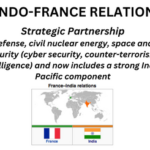Indo-Pacific Economic Framework Ministerial Meeting: Basics Explained

Negotiations for the Supply Chains (Pillar-II) Agreement were substantially concluded during the second in-person Indo-Pacific Economic Framework (IPEF) Ministerial Meeting held in Detroit on 27 May 2023, hosted by the US.
Under this Agreement, IPEF partner countries are seeking to: make supply chains more resilient, robust, and well-integrated through crisis response measures;
cooperation for mitigation of the effect of disruptions to better ensure business continuity, and improve logistics and connectivity;
promoting investments particularly in critical sectors and production of key goods; and worker role enhancement through requisite upskilling and reskilling, and increasing comparability of skills credentials frameworks across IPEF. It entails cooperative and collaborative efforts among the IPEF partners.
Once implemented, the Supply Chain Agreement is expected to bring in a number of benefits to India and the other IPEF partner countries. Some of the key benefits expected are: potential shift of production centres in key goods/critical sectors to India; bolstering of domestic manufacturing capacities; giving a boost to Aatmanirbhar Bharat and Production Linked Initiatives schemes; mobilization of investments especially in production of key goods, logistics services and infrastructure; deeper integration of India in the Global Supply and Value Chains particularly of Indian MSMEs; enhanced exports from India; upward mobility in the value chains; mitigation of risks of economic disruptions to India from supply chain shocks/adverse events; creation of a seamless regional trade ecosystem facilitating flow of Indian products; enhanced trade facilitation including through digital exchange of trade documentation, quicker port clearances; joint Research and Development; and workforce development.
LEARNING FROM HOME/ WITHOUT CLASSES/ BASICS
The Indo-Pacific Economic Framework for Prosperity (IPEF) was launched in May 2022; that seeks an open, inclusive, interconnected, and secure Indo-Pacific for sustainable growth of the region
It’s a loose framework that brings together 13 countries to shape rules on key focus areas like the digital economy, trusted supply chains, clean economic growth, corporate accountability, and anti-corruption.
Its members include the US, Australia, Brunei Darussalam, Fiji, India, Indonesia, Japan, the Republic of Korea, Malaysia, New Zealand, the Philippines, Singapore, Thailand and Vietnam.
It’s an economic agreement, and it has four pillars. They are: connected economy (or trade), supply chains, clean economy, and fair economy.
India sees this framework as crucial for continued growth, peace, and prosperity in the Indo-Pacific region and intends to deepen economic engagement among partners in a free, open, and inclusive manner.
The group gives flexibility to its members to be part of discussions and agreements on any of the issues or opt out of some. India is out of the discussion on trade pillar.





0 Comments